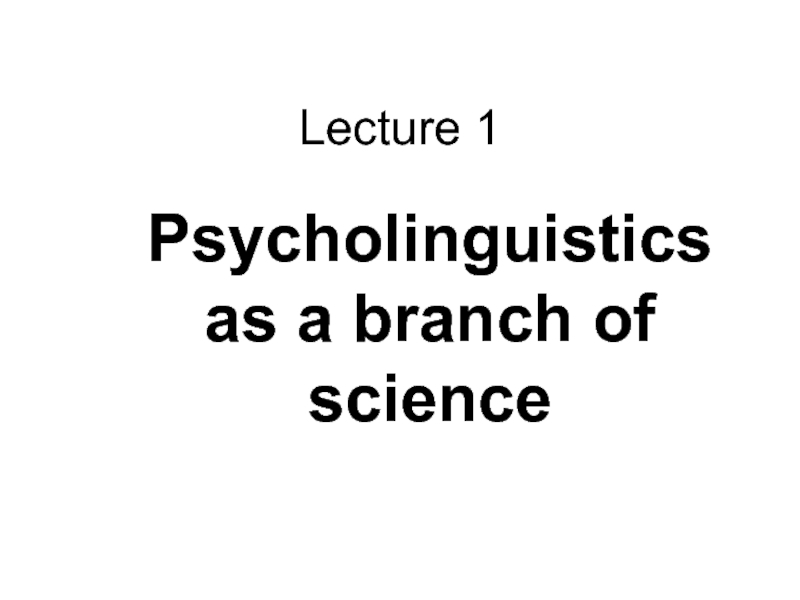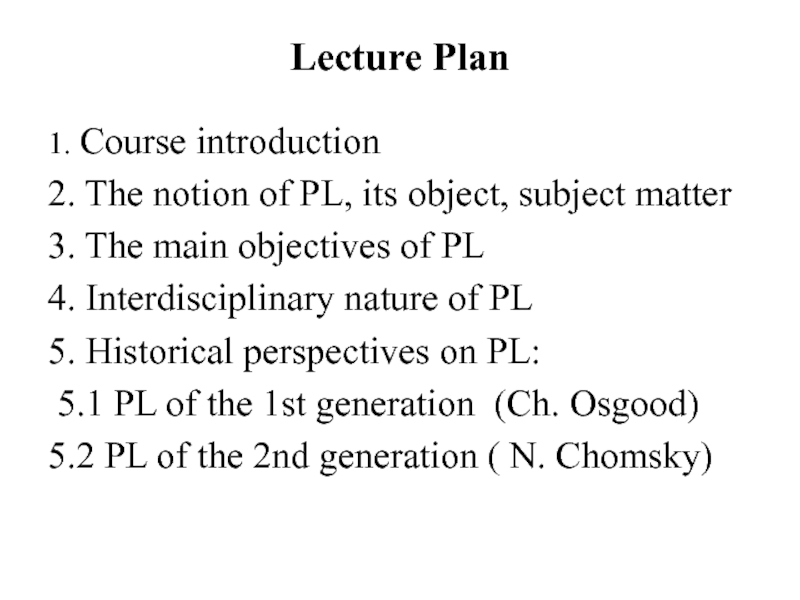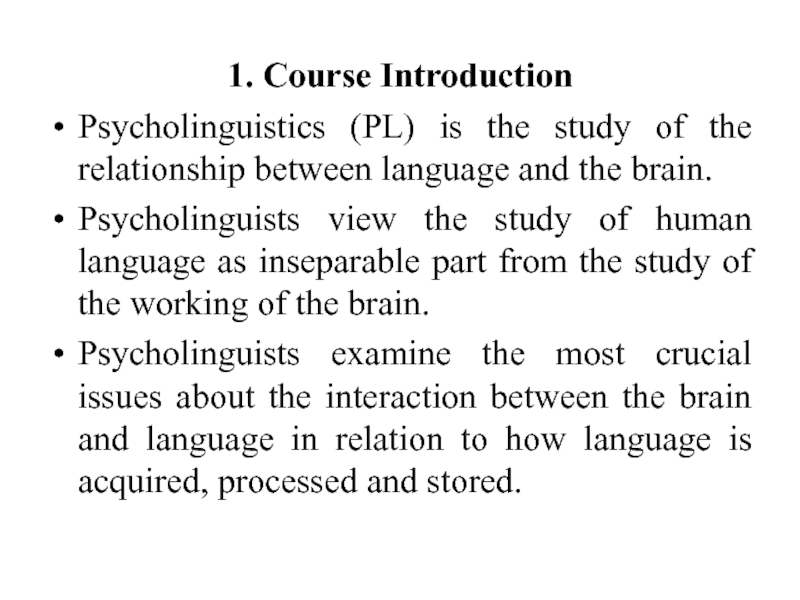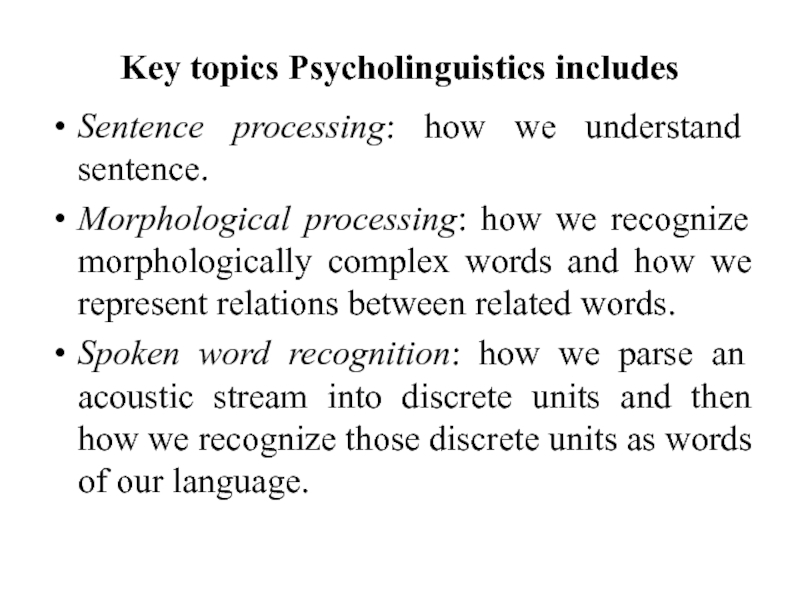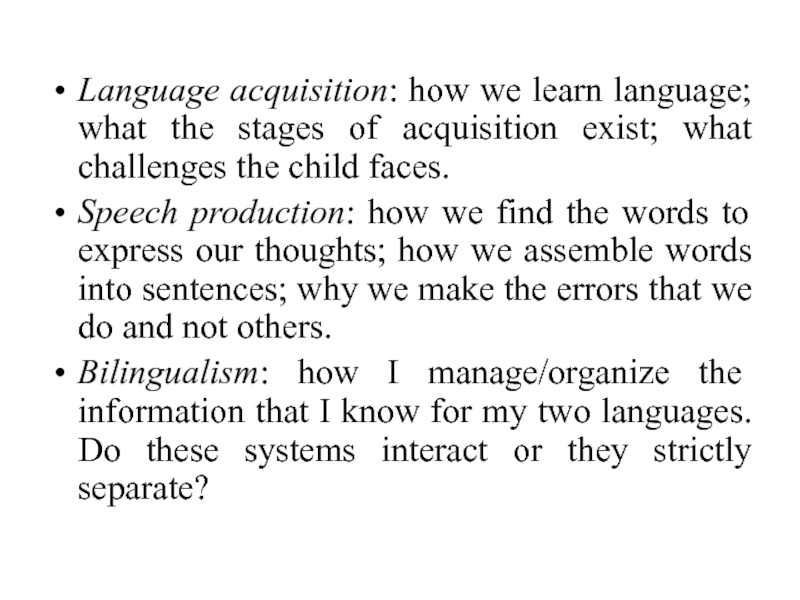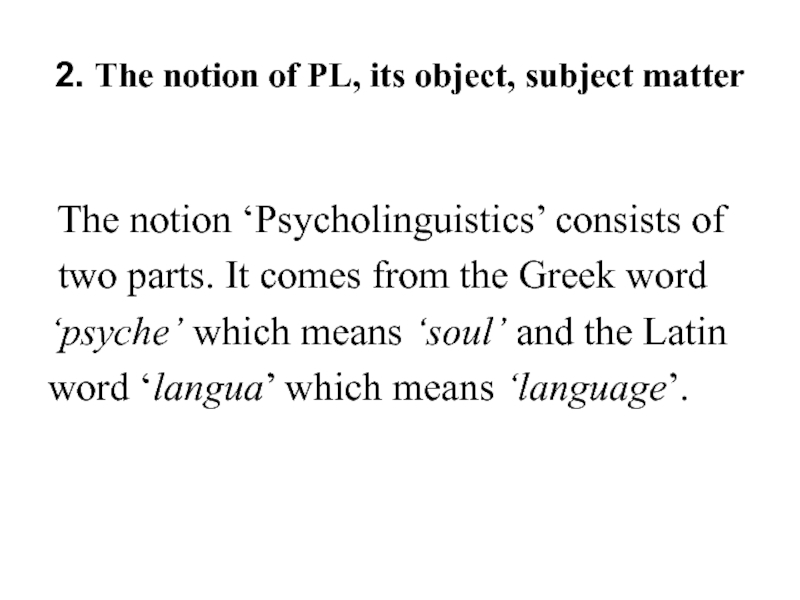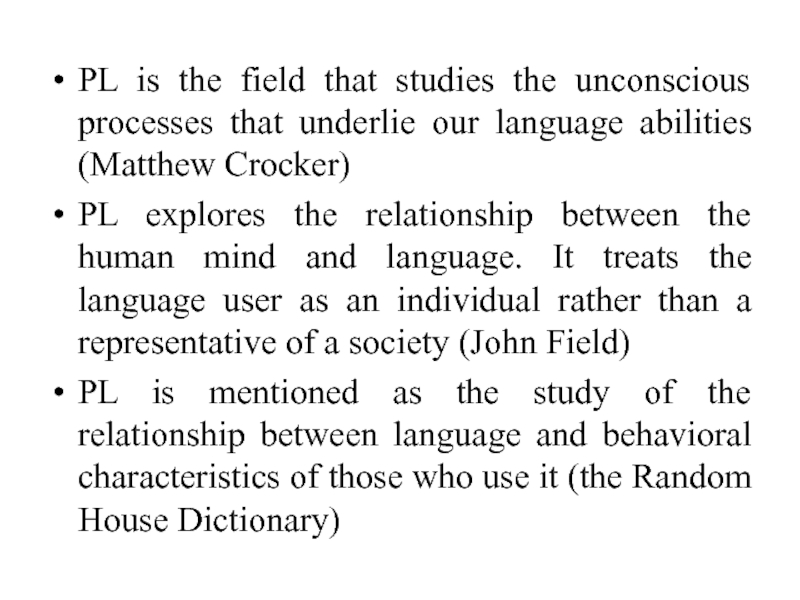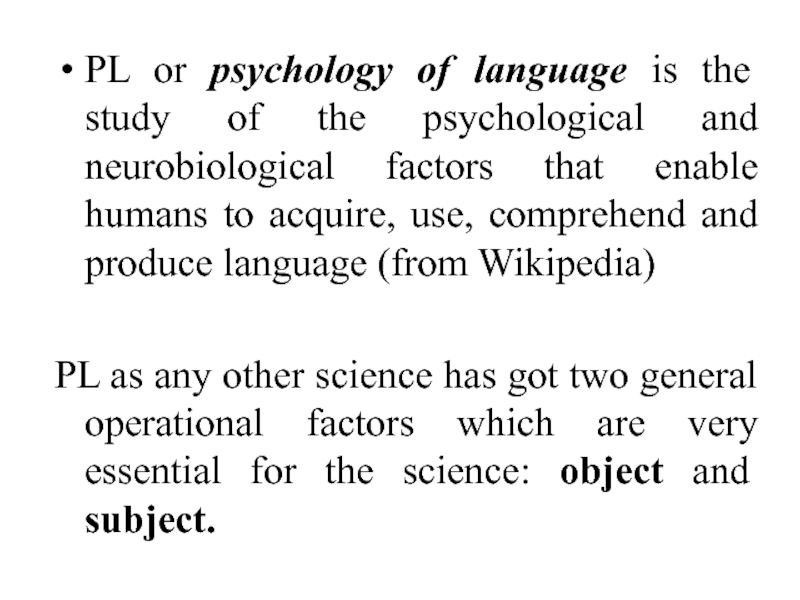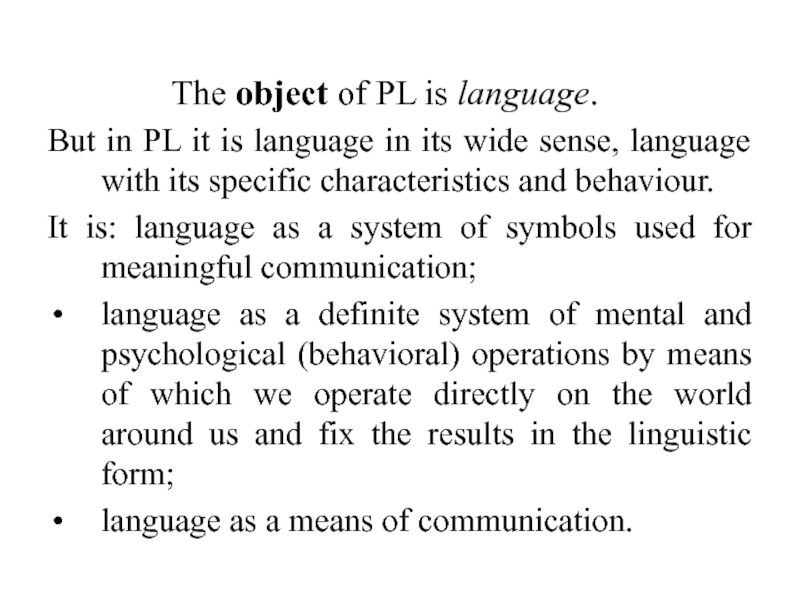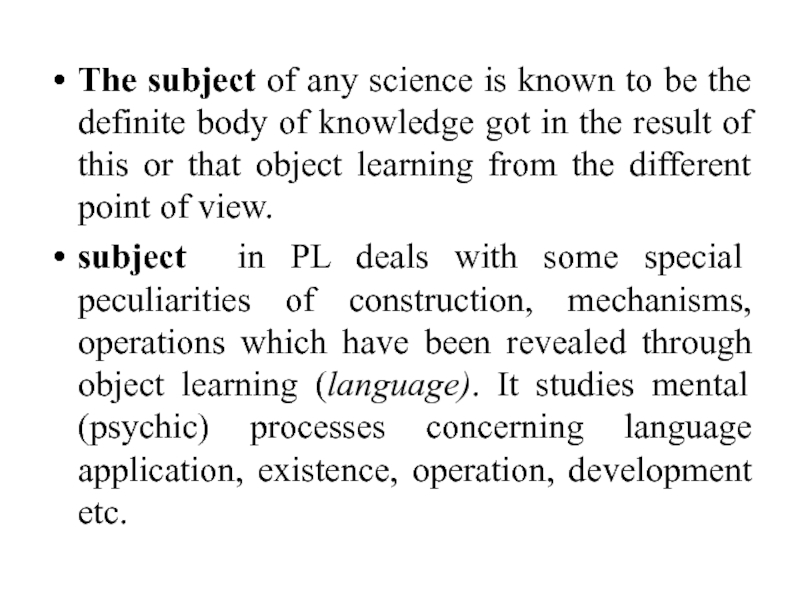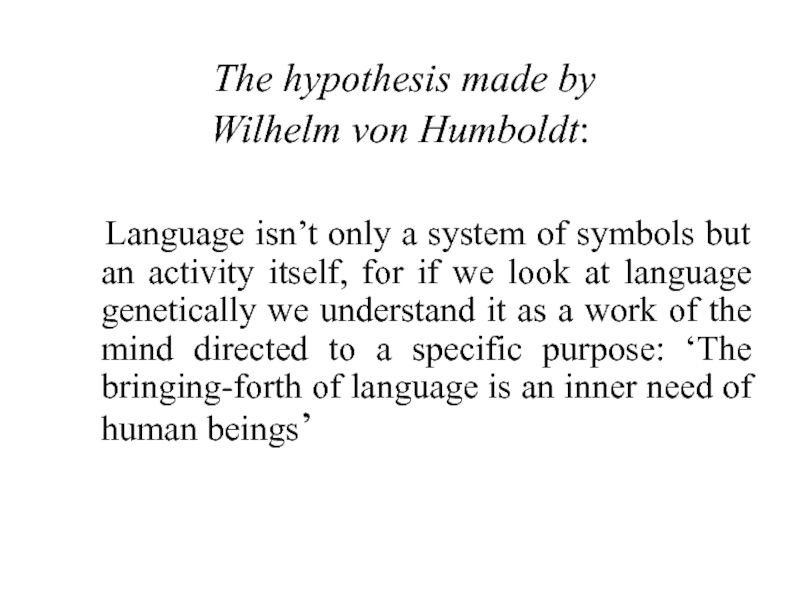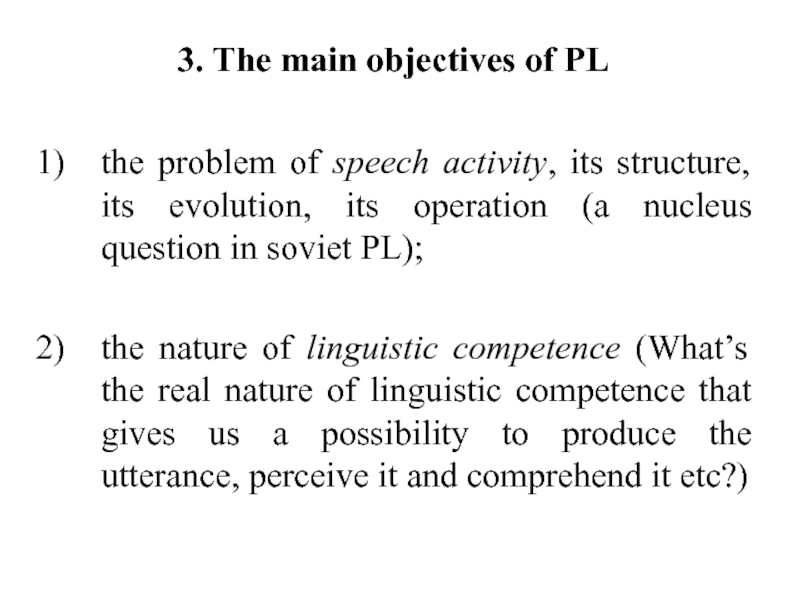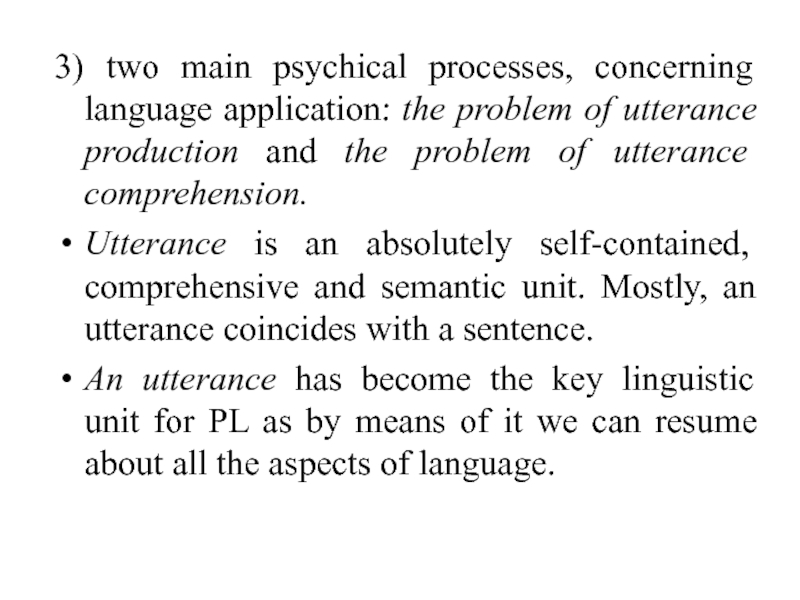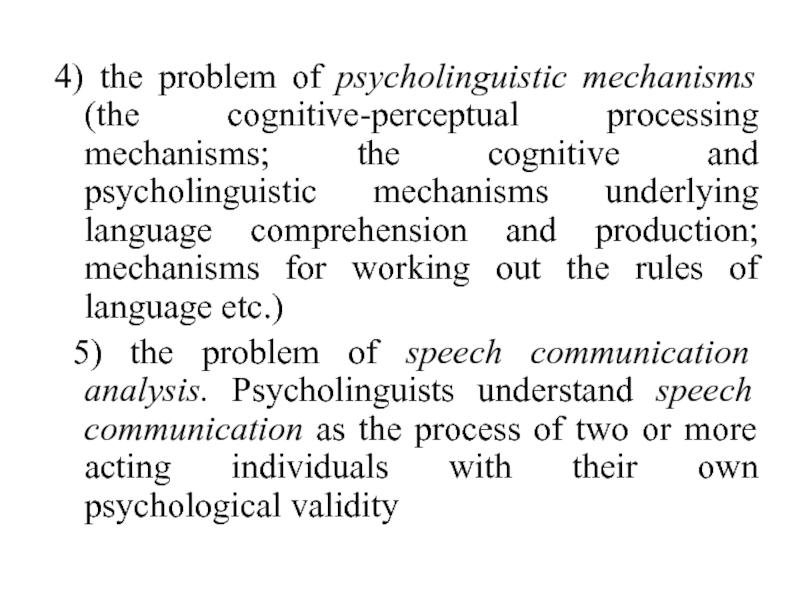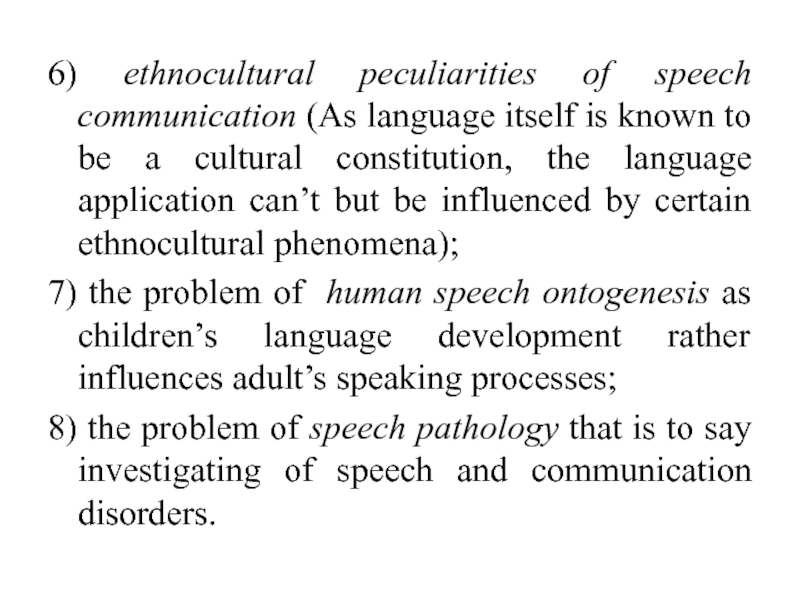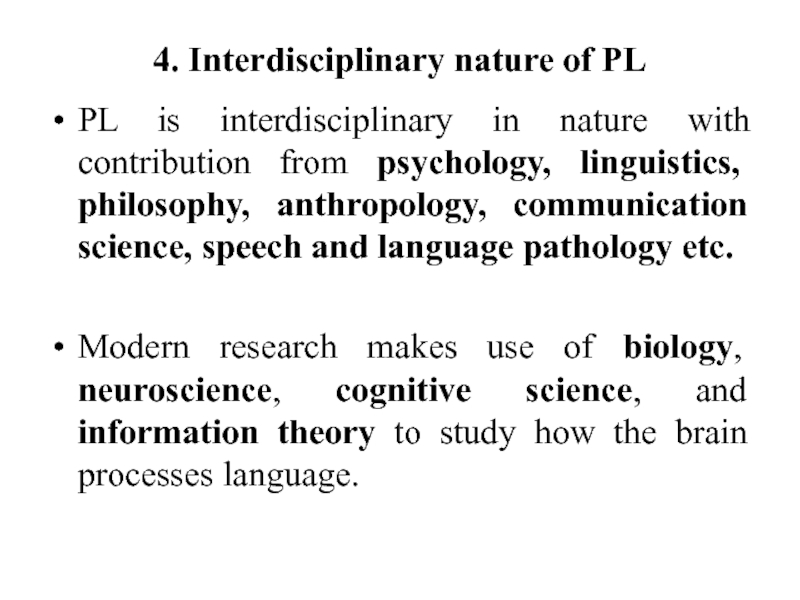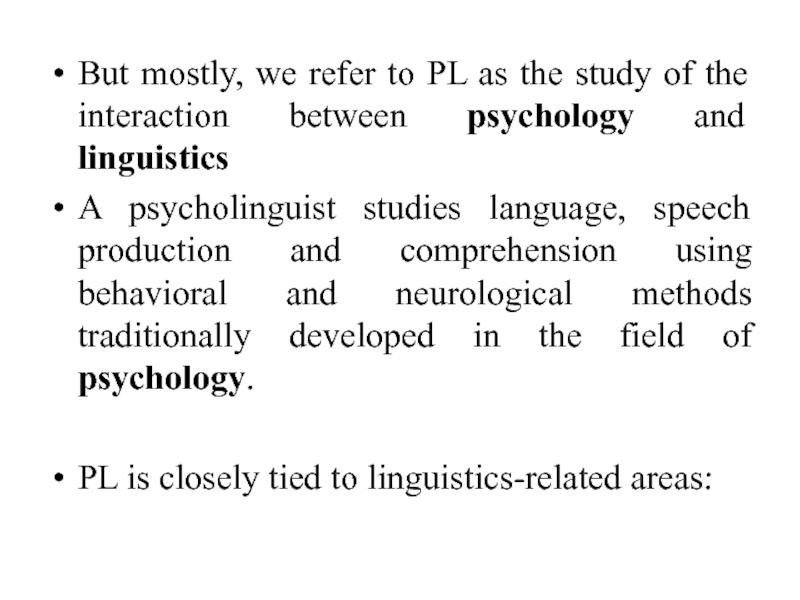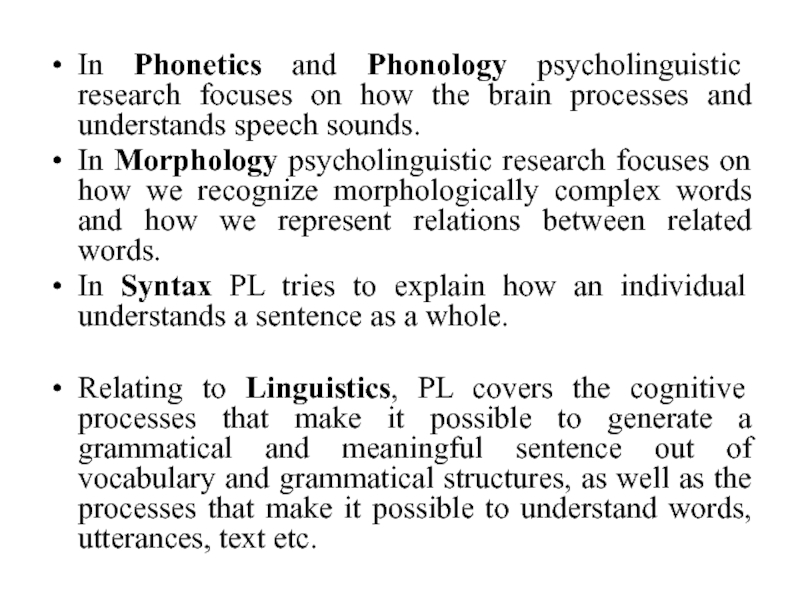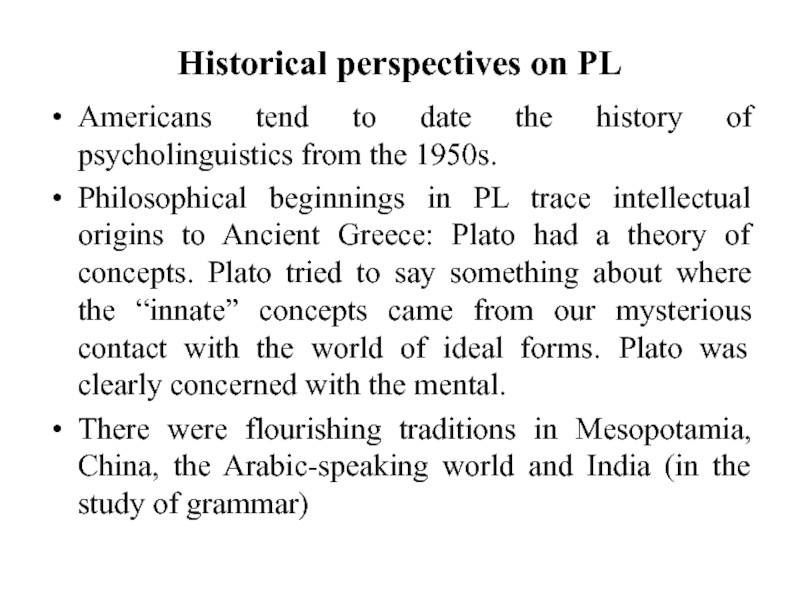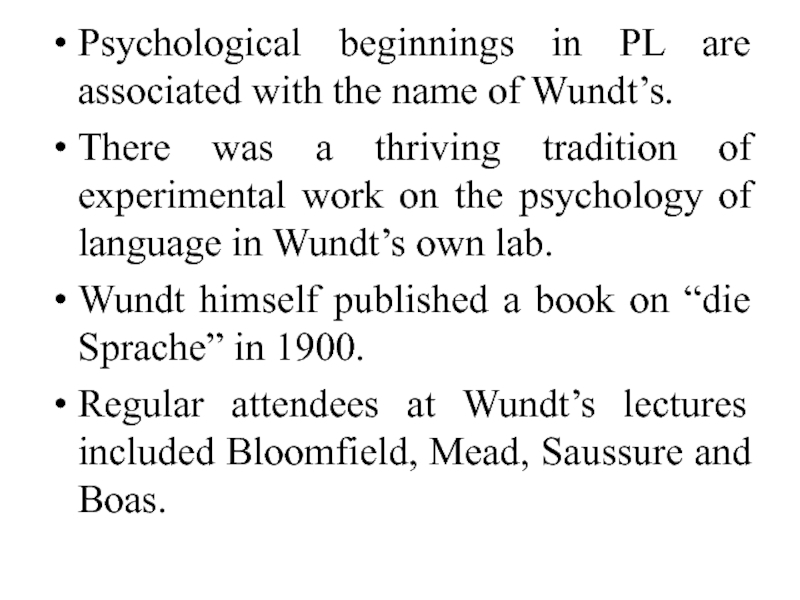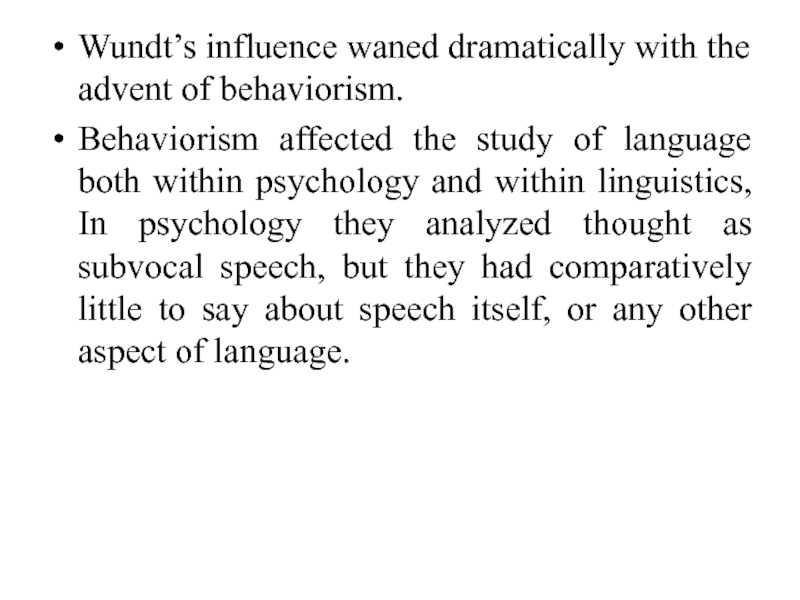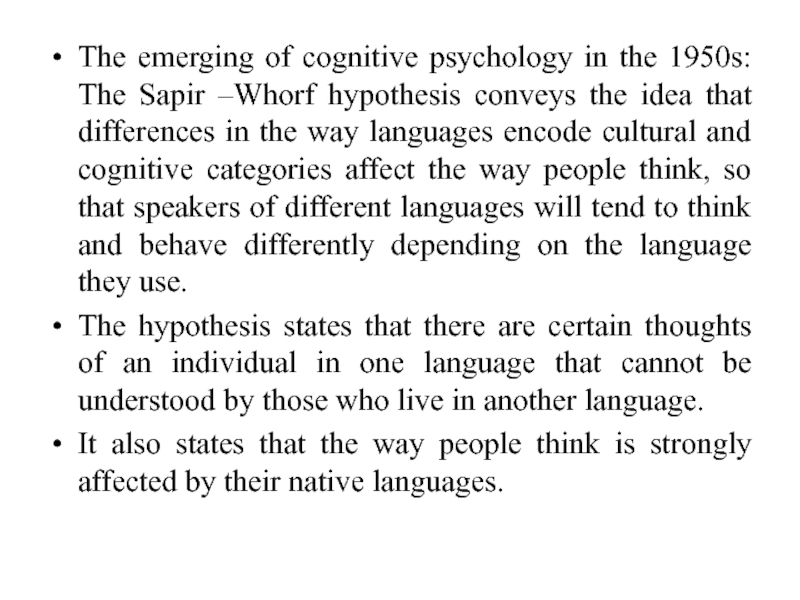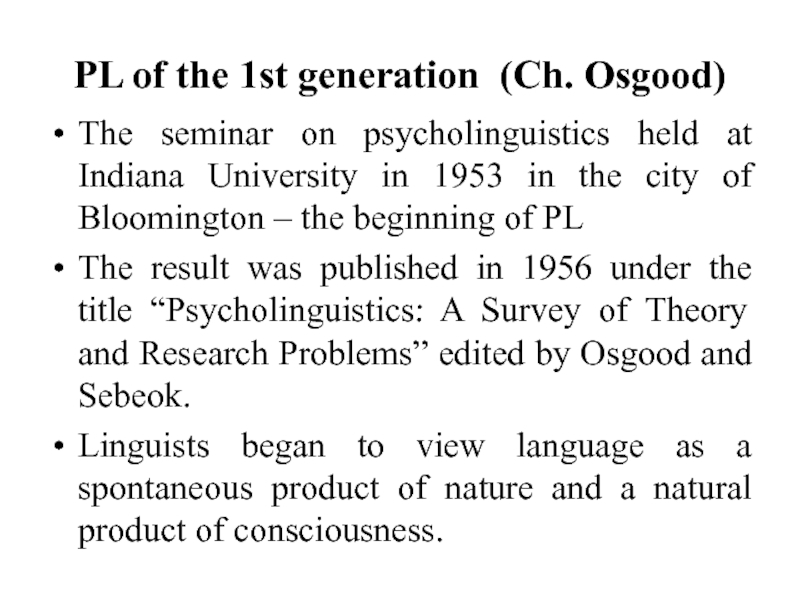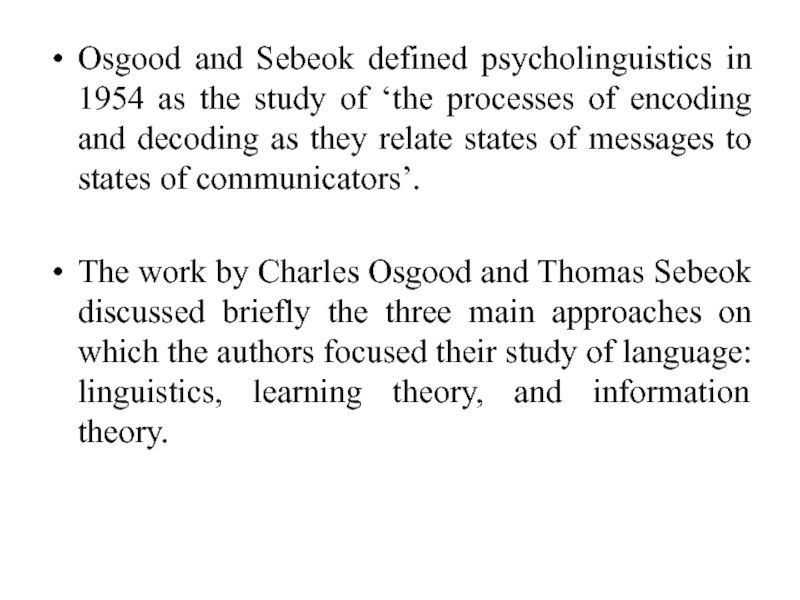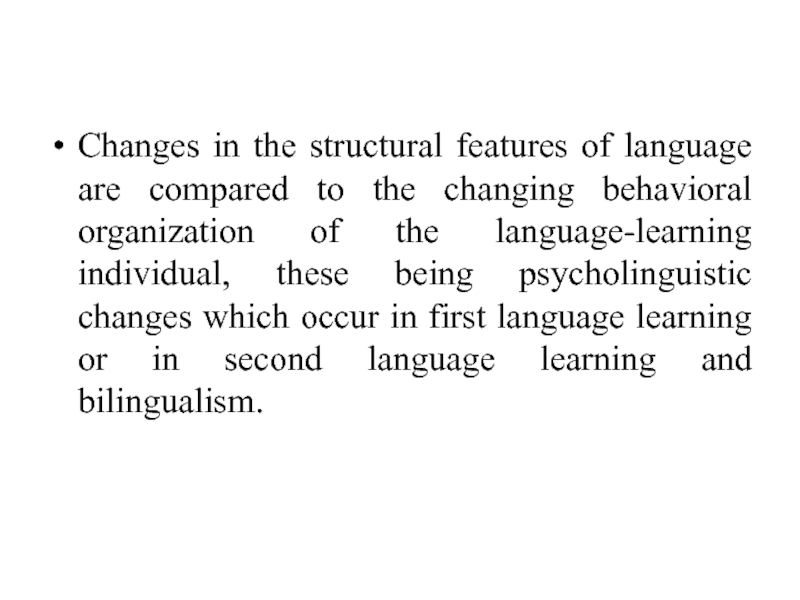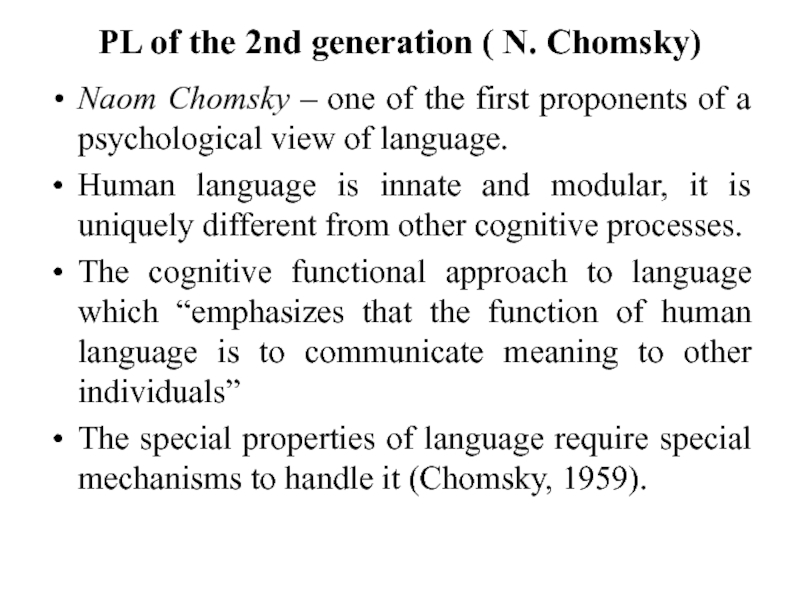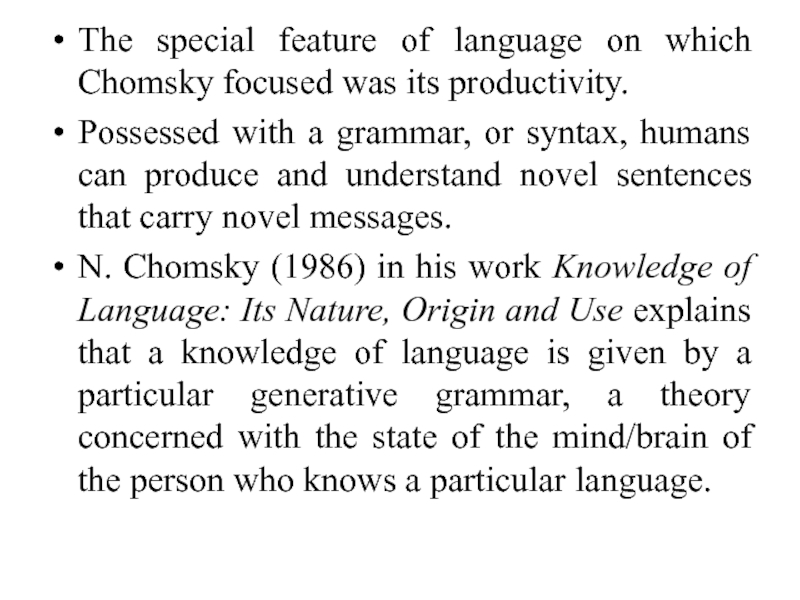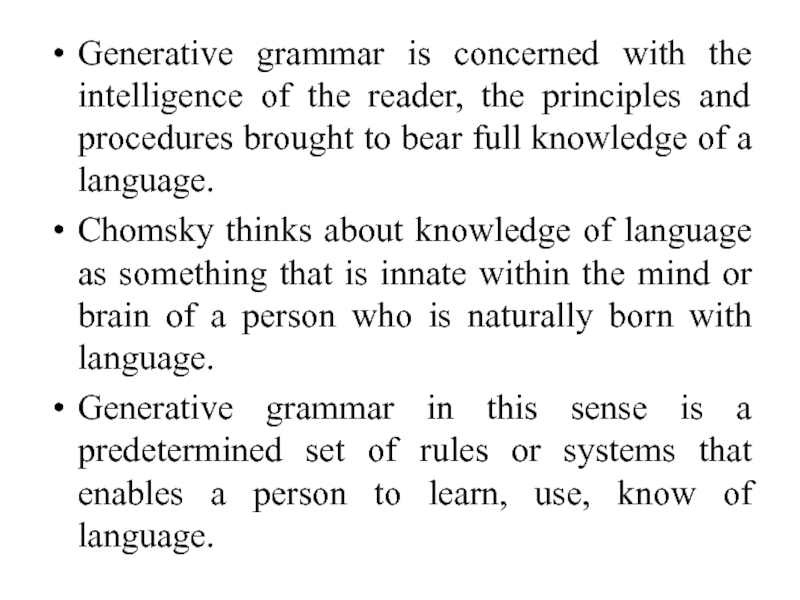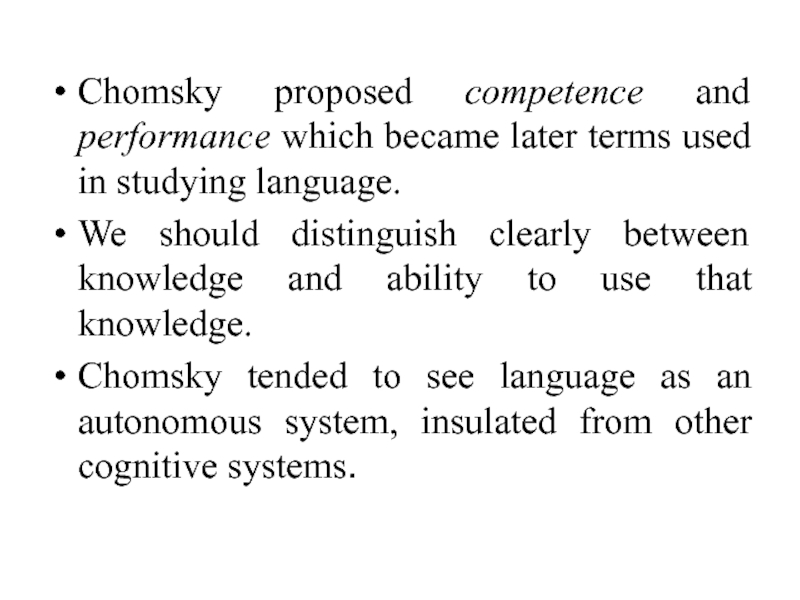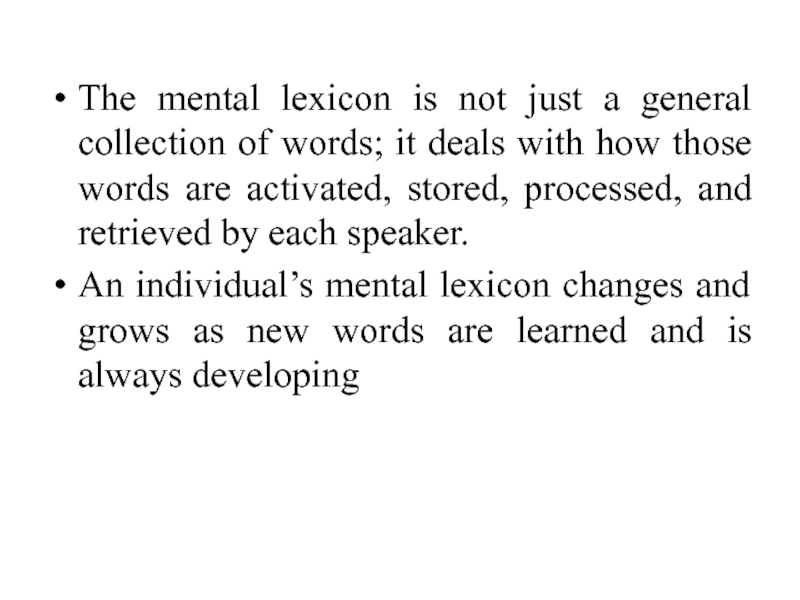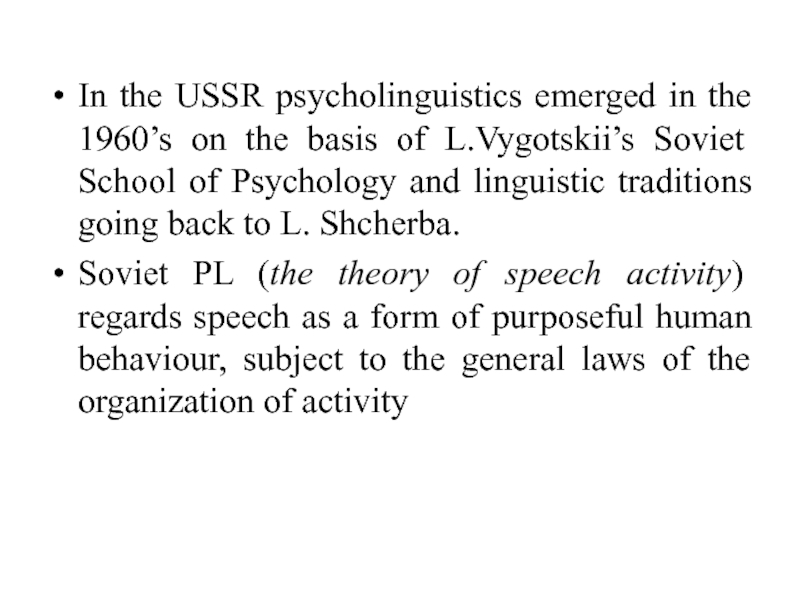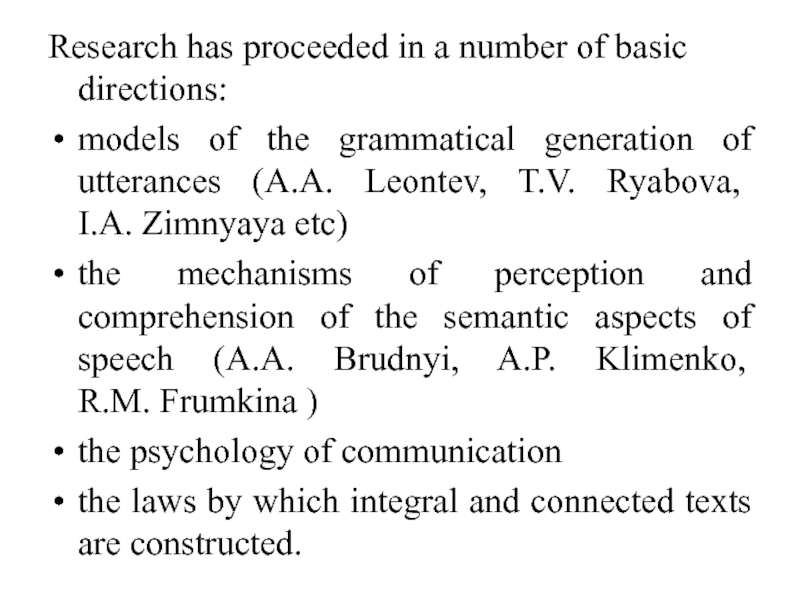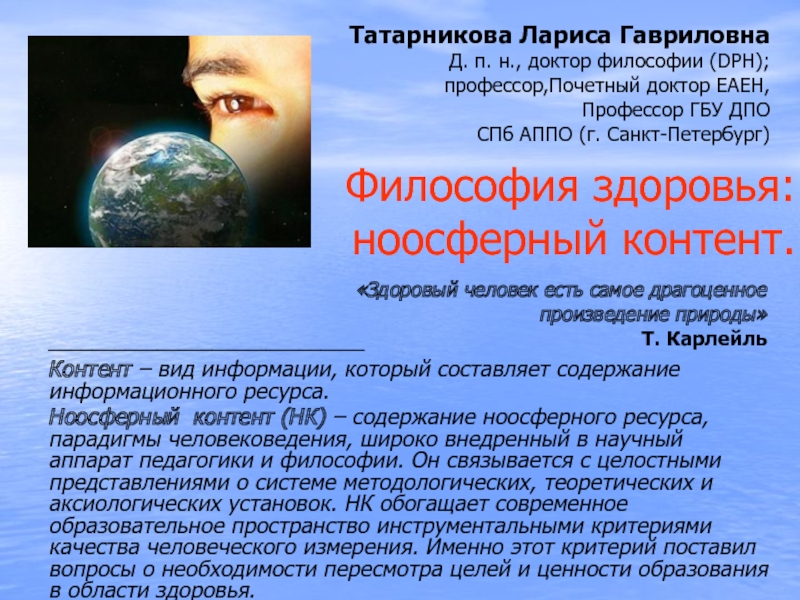- Главная
- Разное
- Дизайн
- Бизнес и предпринимательство
- Аналитика
- Образование
- Развлечения
- Красота и здоровье
- Финансы
- Государство
- Путешествия
- Спорт
- Недвижимость
- Армия
- Графика
- Культурология
- Еда и кулинария
- Лингвистика
- Английский язык
- Астрономия
- Алгебра
- Биология
- География
- Детские презентации
- Информатика
- История
- Литература
- Маркетинг
- Математика
- Медицина
- Менеджмент
- Музыка
- МХК
- Немецкий язык
- ОБЖ
- Обществознание
- Окружающий мир
- Педагогика
- Русский язык
- Технология
- Физика
- Философия
- Химия
- Шаблоны, картинки для презентаций
- Экология
- Экономика
- Юриспруденция
Psycholinguistics as a branch of science. (Lecture 1) презентация
Содержание
- 1. Psycholinguistics as a branch of science. (Lecture 1)
- 2. Lecture Plan 1. Course introduction 2. The
- 3. 1. Course Introduction Psycholinguistics (PL) is the
- 4. Key topics Psycholinguistics includes Sentence processing:
- 5. Language acquisition: how we learn language; what
- 6. 2. The notion of PL, its object,
- 7. PL is the field that studies the
- 8. PL or psychology of language is the
- 10. The subject of any science is known
- 11. The hypothesis made by Wilhelm
- 12. 3. The main objectives of PL
- 13. 3) two main psychical processes, concerning language
- 14. 4) the problem of psycholinguistic mechanisms (the
- 15. 6) ethnocultural peculiarities of speech communication (As
- 16. 4. Interdisciplinary nature of PL PL is
- 17. But mostly, we refer to PL as
- 18. In Phonetics and Phonology psycholinguistic research focuses
- 19. 5. Historical perspectives on PL:
- 20. Historical perspectives on PL Americans tend to
- 21. Psychological beginnings in PL are associated with
- 22. Wundt’s influence waned dramatically with the advent
- 23. The emerging of cognitive psychology in the
- 24. PL of the 1st generation (Ch. Osgood)
- 25. Osgood and Sebeok defined psycholinguistics in 1954
- 26. Changes in the structural features
- 27. PL of the 2nd generation (
- 28. The special feature of language on which
- 29. Generative grammar is concerned with the intelligence
- 30. Chomsky proposed competence and performance which
- 31. We store a great deal of information
- 32. The mental lexicon is not just
- 33. In the USSR psycholinguistics emerged in
- 34. Research has proceeded in a number of
Слайд 2Lecture Plan
1. Course introduction
2. The notion of PL, its object, subject
matter
3. The main objectives of PL
4. Interdisciplinary nature of PL
5. Historical perspectives on PL:
5.1 PL of the 1st generation (Ch. Osgood)
5.2 PL of the 2nd generation ( N. Chomsky)
3. The main objectives of PL
4. Interdisciplinary nature of PL
5. Historical perspectives on PL:
5.1 PL of the 1st generation (Ch. Osgood)
5.2 PL of the 2nd generation ( N. Chomsky)
Слайд 31. Course Introduction
Psycholinguistics (PL) is the study of the relationship between
language and the brain.
Psycholinguists view the study of human language as inseparable part from the study of the working of the brain.
Psycholinguists examine the most crucial issues about the interaction between the brain and language in relation to how language is acquired, processed and stored.
Psycholinguists view the study of human language as inseparable part from the study of the working of the brain.
Psycholinguists examine the most crucial issues about the interaction between the brain and language in relation to how language is acquired, processed and stored.
Слайд 4Key topics Psycholinguistics includes
Sentence processing: how we understand sentence.
Morphological processing:
how we recognize morphologically complex words and how we represent relations between related words.
Spoken word recognition: how we parse an acoustic stream into discrete units and then how we recognize those discrete units as words of our language.
Spoken word recognition: how we parse an acoustic stream into discrete units and then how we recognize those discrete units as words of our language.
Слайд 5Language acquisition: how we learn language; what the stages of acquisition
exist; what challenges the child faces.
Speech production: how we find the words to express our thoughts; how we assemble words into sentences; why we make the errors that we do and not others.
Bilingualism: how I manage/organize the information that I know for my two languages. Do these systems interact or they strictly separate?
Speech production: how we find the words to express our thoughts; how we assemble words into sentences; why we make the errors that we do and not others.
Bilingualism: how I manage/organize the information that I know for my two languages. Do these systems interact or they strictly separate?
Слайд 62. The notion of PL, its object, subject matter
The notion
‘Psycholinguistics’ consists of
two parts. It comes from the Greek word
‘psyche’ which means ‘soul’ and the Latin
word ‘langua’ which means ‘language’.
two parts. It comes from the Greek word
‘psyche’ which means ‘soul’ and the Latin
word ‘langua’ which means ‘language’.
Слайд 7PL is the field that studies the unconscious processes that underlie
our language abilities (Matthew Crocker)
PL explores the relationship between the human mind and language. It treats the language user as an individual rather than a representative of a society (John Field)
PL is mentioned as the study of the relationship between language and behavioral characteristics of those who use it (the Random House Dictionary)
PL explores the relationship between the human mind and language. It treats the language user as an individual rather than a representative of a society (John Field)
PL is mentioned as the study of the relationship between language and behavioral characteristics of those who use it (the Random House Dictionary)
Слайд 8PL or psychology of language is the study of the psychological
and neurobiological factors that enable humans to acquire, use, comprehend and produce language (from Wikipedia)
PL as any other science has got two general operational factors which are very essential for the science: object and subject.
PL as any other science has got two general operational factors which are very essential for the science: object and subject.
Слайд 9 The object of PL
is language.
But in PL it is language in its wide sense, language with its specific characteristics and behaviour.
It is: language as a system of symbols used for meaningful communication;
language as a definite system of mental and psychological (behavioral) operations by means of which we operate directly on the world around us and fix the results in the linguistic form;
language as a means of communication.
But in PL it is language in its wide sense, language with its specific characteristics and behaviour.
It is: language as a system of symbols used for meaningful communication;
language as a definite system of mental and psychological (behavioral) operations by means of which we operate directly on the world around us and fix the results in the linguistic form;
language as a means of communication.
Слайд 10The subject of any science is known to be the definite
body of knowledge got in the result of this or that object learning from the different point of view.
subject in PL deals with some special peculiarities of construction, mechanisms, operations which have been revealed through object learning (language). It studies mental (psychic) processes concerning language application, existence, operation, development etc.
subject in PL deals with some special peculiarities of construction, mechanisms, operations which have been revealed through object learning (language). It studies mental (psychic) processes concerning language application, existence, operation, development etc.
Слайд 11 The hypothesis made by
Wilhelm von Humboldt:
Language isn’t only a system of symbols but an activity itself, for if we look at language genetically we understand it as a work of the mind directed to a specific purpose: ‘The bringing-forth of language is an inner need of human beings’
Слайд 123. The main objectives of PL
the problem of speech activity, its
structure, its evolution, its operation (a nucleus question in soviet PL);
the nature of linguistic competence (What’s the real nature of linguistic competence that gives us a possibility to produce the utterance, perceive it and comprehend it etc?)
the nature of linguistic competence (What’s the real nature of linguistic competence that gives us a possibility to produce the utterance, perceive it and comprehend it etc?)
Слайд 133) two main psychical processes, concerning language application: the problem of
utterance production and the problem of utterance comprehension.
Utterance is an absolutely self-contained, comprehensive and semantic unit. Mostly, an utterance coincides with a sentence.
An utterance has become the key linguistic unit for PL as by means of it we can resume about all the aspects of language.
Utterance is an absolutely self-contained, comprehensive and semantic unit. Mostly, an utterance coincides with a sentence.
An utterance has become the key linguistic unit for PL as by means of it we can resume about all the aspects of language.
Слайд 144) the problem of psycholinguistic mechanisms (the cognitive-perceptual processing mechanisms; the
cognitive and psycholinguistic mechanisms underlying language comprehension and production; mechanisms for working out the rules of language etc.)
5) the problem of speech communication analysis. Psycholinguists understand speech communication as the process of two or more acting individuals with their own psychological validity
5) the problem of speech communication analysis. Psycholinguists understand speech communication as the process of two or more acting individuals with their own psychological validity
Слайд 156) ethnocultural peculiarities of speech communication (As language itself is known
to be a cultural constitution, the language application can’t but be influenced by certain ethnocultural phenomena);
7) the problem of human speech ontogenesis as children’s language development rather influences adult’s speaking processes;
8) the problem of speech pathology that is to say investigating of speech and communication disorders.
7) the problem of human speech ontogenesis as children’s language development rather influences adult’s speaking processes;
8) the problem of speech pathology that is to say investigating of speech and communication disorders.
Слайд 164. Interdisciplinary nature of PL
PL is interdisciplinary in nature with contribution
from psychology, linguistics, philosophy, anthropology, communication science, speech and language pathology etc.
Modern research makes use of biology, neuroscience, cognitive science, and information theory to study how the brain processes language.
Modern research makes use of biology, neuroscience, cognitive science, and information theory to study how the brain processes language.
Слайд 17But mostly, we refer to PL as the study of the
interaction between psychology and linguistics
A psycholinguist studies language, speech production and comprehension using behavioral and neurological methods traditionally developed in the field of psychology.
PL is closely tied to linguistics-related areas:
A psycholinguist studies language, speech production and comprehension using behavioral and neurological methods traditionally developed in the field of psychology.
PL is closely tied to linguistics-related areas:
Слайд 18In Phonetics and Phonology psycholinguistic research focuses on how the brain
processes and understands speech sounds.
In Morphology psycholinguistic research focuses on how we recognize morphologically complex words and how we represent relations between related words.
In Syntax PL tries to explain how an individual understands a sentence as a whole.
Relating to Linguistics, PL covers the cognitive processes that make it possible to generate a grammatical and meaningful sentence out of vocabulary and grammatical structures, as well as the processes that make it possible to understand words, utterances, text etc.
In Morphology psycholinguistic research focuses on how we recognize morphologically complex words and how we represent relations between related words.
In Syntax PL tries to explain how an individual understands a sentence as a whole.
Relating to Linguistics, PL covers the cognitive processes that make it possible to generate a grammatical and meaningful sentence out of vocabulary and grammatical structures, as well as the processes that make it possible to understand words, utterances, text etc.
Слайд 19
5. Historical perspectives on PL:
5.1 PL of the 1st
generation (Ch. Osgood)
5.2 PL of the 2nd generation ( N. Chomsky)
5.2 PL of the 2nd generation ( N. Chomsky)
Слайд 20Historical perspectives on PL
Americans tend to date the history of psycholinguistics
from the 1950s.
Philosophical beginnings in PL trace intellectual origins to Ancient Greece: Plato had a theory of concepts. Plato tried to say something about where the “innate” concepts came from our mysterious contact with the world of ideal forms. Plato was clearly concerned with the mental.
There were flourishing traditions in Mesopotamia, China, the Arabic-speaking world and India (in the study of grammar)
.
Philosophical beginnings in PL trace intellectual origins to Ancient Greece: Plato had a theory of concepts. Plato tried to say something about where the “innate” concepts came from our mysterious contact with the world of ideal forms. Plato was clearly concerned with the mental.
There were flourishing traditions in Mesopotamia, China, the Arabic-speaking world and India (in the study of grammar)
.
Слайд 21Psychological beginnings in PL are associated with the name of Wundt’s.
There
was a thriving tradition of experimental work on the psychology of language in Wundt’s own lab.
Wundt himself published a book on “die Sprache” in 1900.
Regular attendees at Wundt’s lectures included Bloomfield, Mead, Saussure and Boas.
Wundt himself published a book on “die Sprache” in 1900.
Regular attendees at Wundt’s lectures included Bloomfield, Mead, Saussure and Boas.
Слайд 22Wundt’s influence waned dramatically with the advent of behaviorism.
Behaviorism affected
the study of language both within psychology and within linguistics, In psychology they analyzed thought as subvocal speech, but they had comparatively little to say about speech itself, or any other aspect of language.
Слайд 23The emerging of cognitive psychology in the 1950s: The Sapir –Whorf
hypothesis conveys the idea that differences in the way languages encode cultural and cognitive categories affect the way people think, so that speakers of different languages will tend to think and behave differently depending on the language they use.
The hypothesis states that there are certain thoughts of an individual in one language that cannot be understood by those who live in another language.
It also states that the way people think is strongly affected by their native languages.
The hypothesis states that there are certain thoughts of an individual in one language that cannot be understood by those who live in another language.
It also states that the way people think is strongly affected by their native languages.
Слайд 24PL of the 1st generation (Ch. Osgood)
The seminar on psycholinguistics held
at Indiana University in 1953 in the city of Bloomington – the beginning of PL
The result was published in 1956 under the title “Psycholinguistics: A Survey of Theory and Research Problems” edited by Osgood and Sebeok.
Linguists began to view language as a spontaneous product of nature and a natural product of consciousness.
The result was published in 1956 under the title “Psycholinguistics: A Survey of Theory and Research Problems” edited by Osgood and Sebeok.
Linguists began to view language as a spontaneous product of nature and a natural product of consciousness.
Слайд 25Osgood and Sebeok defined psycholinguistics in 1954 as the study of
‘the processes of encoding and decoding as they relate states of messages to states of communicators’.
The work by Charles Osgood and Thomas Sebeok discussed briefly the three main approaches on which the authors focused their study of language: linguistics, learning theory, and information theory.
The work by Charles Osgood and Thomas Sebeok discussed briefly the three main approaches on which the authors focused their study of language: linguistics, learning theory, and information theory.
Слайд 26
Changes in the structural features of language are compared to the
changing behavioral organization of the language-learning individual, these being psycholinguistic changes which occur in first language learning or in second language learning and bilingualism.
Слайд 27
PL of the 2nd generation ( N. Chomsky)
Naom Chomsky – one
of the first proponents of a psychological view of language.
Human language is innate and modular, it is uniquely different from other cognitive processes.
The cognitive functional approach to language which “emphasizes that the function of human language is to communicate meaning to other individuals”
The special properties of language require special mechanisms to handle it (Chomsky, 1959).
Human language is innate and modular, it is uniquely different from other cognitive processes.
The cognitive functional approach to language which “emphasizes that the function of human language is to communicate meaning to other individuals”
The special properties of language require special mechanisms to handle it (Chomsky, 1959).
Слайд 28The special feature of language on which Chomsky focused was its
productivity.
Possessed with a grammar, or syntax, humans can produce and understand novel sentences that carry novel messages.
N. Chomsky (1986) in his work Knowledge of Language: Its Nature, Origin and Use explains that a knowledge of language is given by a particular generative grammar, a theory concerned with the state of the mind/brain of the person who knows a particular language.
Possessed with a grammar, or syntax, humans can produce and understand novel sentences that carry novel messages.
N. Chomsky (1986) in his work Knowledge of Language: Its Nature, Origin and Use explains that a knowledge of language is given by a particular generative grammar, a theory concerned with the state of the mind/brain of the person who knows a particular language.
Слайд 29Generative grammar is concerned with the intelligence of the reader, the
principles and procedures brought to bear full knowledge of a language.
Chomsky thinks about knowledge of language as something that is innate within the mind or brain of a person who is naturally born with language.
Generative grammar in this sense is a predetermined set of rules or systems that enables a person to learn, use, know of language.
Chomsky thinks about knowledge of language as something that is innate within the mind or brain of a person who is naturally born with language.
Generative grammar in this sense is a predetermined set of rules or systems that enables a person to learn, use, know of language.
Слайд 30
Chomsky proposed competence and performance which became later terms used in
studying language.
We should distinguish clearly between knowledge and ability to use that knowledge.
Chomsky tended to see language as an autonomous system, insulated from other cognitive systems.
We should distinguish clearly between knowledge and ability to use that knowledge.
Chomsky tended to see language as an autonomous system, insulated from other cognitive systems.
Слайд 31We store a great deal of information about the properties of
words in our mental lexicon, and we retrieve this information when we understand or produce language.
The mental lexicon is defined as a mental dictionary that contains information regarding a word's meaning, pronunciation, syntactic characteristics, and so on.
The mental lexicon is a construct used in linguistics and psycholinguistics to refer to individual speakers’ lexical, or word representations.
The mental lexicon is defined as a mental dictionary that contains information regarding a word's meaning, pronunciation, syntactic characteristics, and so on.
The mental lexicon is a construct used in linguistics and psycholinguistics to refer to individual speakers’ lexical, or word representations.
Слайд 32
The mental lexicon is not just a general collection of words;
it deals with how those words are activated, stored, processed, and retrieved by each speaker.
An individual’s mental lexicon changes and grows as new words are learned and is always developing
An individual’s mental lexicon changes and grows as new words are learned and is always developing
Слайд 33
In the USSR psycholinguistics emerged in the 1960’s on the basis
of L.Vygotskii’s Soviet School of Psychology and linguistic traditions going back to L. Shcherba.
Soviet PL (the theory of speech activity) regards speech as a form of purposeful human behaviour, subject to the general laws of the organization of activity
Soviet PL (the theory of speech activity) regards speech as a form of purposeful human behaviour, subject to the general laws of the organization of activity
Слайд 34Research has proceeded in a number of basic directions:
models of the
grammatical generation of utterances (A.A. Leontev, T.V. Ryabova,
I.A. Zimnyaya etc)
the mechanisms of perception and comprehension of the semantic aspects of speech (A.A. Brudnyi, A.P. Klimenko, R.M. Frumkina )
the psychology of communication
the laws by which integral and connected texts are constructed.
the mechanisms of perception and comprehension of the semantic aspects of speech (A.A. Brudnyi, A.P. Klimenko, R.M. Frumkina )
the psychology of communication
the laws by which integral and connected texts are constructed.
